OCCUPY CENTRAL - DAY 25: Full coverage of the day’s events
OCCUPY CENTRAL - THE DEBATE: Full coverage of student-government talks
PUBLISHED : Tuesday, 21 October, 2014, 3:30pm
UPDATED : Wednesday, 22 October, 2014, 3:36pm
With the government insisting Beijing will not bow to protesters' demands, and students refusing to leave their demonstration zones until concessions have been made, the two sides remain deadlocked after an initial round of talks on Tuesday.
After the meeting, Chief Secretary Carrie Lam said the government would consider submitting a report to the Hong Kong and Macau Affairs Office about the public's reaction to the NPC Standing Committee's framework on political reform.
The Federation of Students' Alex Chow later described the talks as "vague" and said the government had not offered any concrete proposals in response to their demands for political reform by 2017.
Watch: Protesters watch and react to talks being broadcast in Admiralty
11.30pm: That brings our live coverage of the debate to an end.
11.15pm Mong Kok: Federation of Students representatives Yvonne Leung Lai-kwok and Eason Chung Yiu-wah show up in Mong Kok to thank protesters for standing up for democratic values.
Leung criticises Justice Secretary Rimsky Yuen Kwok-keung, a fellow University of Hong Kong alumnus, for claiming to defend the rule of law at the expense of the public's demands for true democracy.
“The courts cannot solve a political problem, only the government can. But has anyone seen them come out to speak to the people?” says Leung, one of the five representatives at the talks with the government this evening.
“At the talks with government officials today, I really wanted to say to Carrie Lam: ‘Long time no see’.”
Leung acknowledges that a court injunction had been issued for Mong Kok, putting protesters there at the risk of criminal proceeedings.
“All I can say is that we didn’t expect this ... But neither could I believe the Court of First Instance would be placed on the table [as a tool] by the government.”
Leung says she plans to remain at the Mong Kok camp for the rest of the movement until a consensus can be reached with the government.
“I hope everyone will stay here because we cannot simply allow the government in two hours, to use their sophistry ... and strip away the hard work we have achieved in the last twenty-something days.”
11pm Causeway Bay: About 150 people are watching a live broadcast of the Hong Kong Federation of Students' leaders giving speeches in Admiralty.
Some protesters criticise the fact that no mention was made about the Occupy sit-in taking place in Causeway Bay during the meeting between the students and representatives from the government.
 10.30pm: An alliance of social welfare concern groups strongly criticises CY Leung’s recent comments about democratic reform in Hong Kong, saying they were discriminatory towards those in the city who earned less than HK$14,000 a month.
10.30pm: An alliance of social welfare concern groups strongly criticises CY Leung’s recent comments about democratic reform in Hong Kong, saying they were discriminatory towards those in the city who earned less than HK$14,000 a month.
In the statement, the alliance accuse Leung of defending the interests of “foreign forces” by insisting on a political system that is biased towards large enterprises.
“We express our strong discontent and regret on the chief executive’s blatant neglect of the contributions made by Hong Kong’s lower income classes – which constitute the majority of the population – to the society and economy,” the statement read.
In the statement, the group urged the establishment of civil nominations for the 2017 chief executive's election and called for the abolition of functional constituencies in the Legislative Council to bring about an end to the current system - which it says “serves only big business”.
In an interview with overseas media on Monday, Chief Executive Leung Chun-ying said that if the government met pro-democracy protesters’ demands it would result in the city’s poorer people dominating any future elections.
During the interview, which was carried by the Wall Street Journal, theFinancial Times and the International New York Times, the embattled chief executive reiterated his position that free elections were "impossible".
9.45pm: Some people in Hong Kong say the government had clearly stated its case and that the protests should end. Here are their views:
Robert Chow Yung, anti-Occupy activist from the Alliance for Peace and Democracy: “The government expressed its sincerity and it did what it could. But I can’t see students responding to that. I call on more people to … let the students know how upset they are [with the protests], and to show that Occupy does not represent the majority.”
Sammy Zhao, 40, mainland businessman: “Most people want a stable government and a stable economy. Of course I don't support [continued protests], because we are Chinese people and we should be united.”
Wyman Kung, 28, engineer and non-protester: “I admire the students’ persistence. I think they are brave and I appreciate their courage, but I think at this stage they should comply with the law and clear the roads."
9.40pm: Civic Party legislator Kenneth Chan Ka-lok says the talks are more like a “monologue”.
"I am very proud of our students. They eloquently expressed our demands for universal suffrage and the people's frustrations," he said. However, "I am very disappointed with the government. They didn't make an effort to address our concerns. They didn't even give reasons to people stop protesting.”
If nothing changes, Chan promised to veto the reform package. "As a political scientist I can't accept it as true universal suffrage,” Chan said.
Former Civic Party lawmaker Margaret Ng said the government responses were “empty and powerless” and dismissed the platform proposed by Carrie Lam as a delaying tactic.
She believes Occupy supporters would not retreat after the talks. Ng urged the government to hold a second dialogue with students as soon as possible.
9.20pm: Protesters and observers alike seem downbeat about a resolution to the stalemate. So what should be the next step? People sound off to SCMP reporters in the streets:
Kevin Ko, 32, insurance agent: “This was not even a dialogue. There was no interaction. Even if there are more meetings in the future I don't think it can be solved this way. We will have to keep occupying the streets.”
Andy Fong, 30, civil engineer: “The students performed well in the talks but I feel they weren’t aggressive enough … Students were facing tough opponents but they seemed to have forgotten about the bargaining chips they have on hand [the protest zones]. [Rimsky Yuen’s statement was also] not logical. Many people demand true universal suffrage, but may not take to the streets.”
Chan Wing-hung,18, Hong Kong Polytechnic University student: "The [government] didn't give any suggestions to improve the current situation. They didn't even guarantee that the NPC standing committee would receive the report. At least for this week, I think we should keep protesting.”
Eric Ma Kit-wai, Chinese University journalism scholar whose specialities include research on Hongkongers’ identity: “How the officials and police described the event [protests] is in such stark contrast to the experiences of those who have witnessed it first-hand. I was in Mong Kok and it was so peaceful. … How can we be convinced that the report would reflect the true views of Hongkongers if those who are going to compile it think in such a way?"
Alvin Leung, 29, watch salesman and non-protester: “They have been talking for so long, but I don’t know if it has any substance. The report to the State Council … and the proposed platform will be useless.”
Ming Lee, 20, student protester: “More dialogue will just waste everybody’s time. Talks like this will not get us anywhere. If she can muster the courage, [Carrie] Lam should come down [to Mong Kok] and talk to us directly.”
9.05pm: Dialogue moderator Professor Leonard Cheng Kwok-hon, president of Lingnan University, gives an assessment of his performance, saying he tried to be "as fair as possible".
Asked why he took part in fielding questions to the students, Cheng said: "I only wanted to let students explain their stance in a detailed way, so that the officials can hear clearly and follow up."
8.45pm: It's now the students' turn for a press conference. The five Federation of Students representatives answered one question in Cantonese, about the prospect of another dialogue, before abruptly ending the session and walking away.
Foreign journalists' request for an English statement went unmet.
After about three minutes, the students reappeared. Federation deputy leader Lester Shum said, "[Leader] Alex [Chow] will now recap in English" – echoing a now-familiar phrase used by police spokesman Steve Hui.
Chow, the student group's secretary general, said they still needed to discuss with different groups and parties before formulating their next action.
He described the dialogue as peaceful, but the proposals put forward by the government were "kind of vague".
8.30pm: Carrie Lam faces questions about the platform's functions and if it will focus on post-2017 discussions, as pan-democrats have vowed to veto the government's upcoming proposal.
Lam says she hopes the platform will "help handle the long-term development of the city's political system, because the development after 2017 ... might need [plenty of] time to discuss and to find consensus".
She says they will discuss who will be invited to become members of the platform and whether it will be a permanent committee.
Constitutional affairs minister Raymond Tam adds that Hongkongers should not only focus on the 2017 chief executive election.
8.15pm: Government officials are now holding a press conference after the dialogue.
Chief Secretary Carrie Lam was asked whether the government's report would describe the "umbrella movement" as one of love and peace, or as a colour revolution. Lam said the report would "reflect public opinion ... And won't insert subjective descriptions".
Constitutional affairs minister Raymond Tam added that his bureau would file the report "in the most efficient way". "If there are public opinion surveys during this period of time, we will include them in the report," Tam said.
8.04pm: That's it, it's all over. Both sides are thanked for taking part.
During the two-hour dialogue Alex Chow spoke four times, while Nathan Law and Yvonne Leung spoke three times each. Eason Chung and Lester Shum spoke twice each.
On the government side, Carrie Lam spoke five times, and Rimsky Yuen and Raymond Tam spoke twice each. Edward Yau and Lau Kong-wah remained silent throughout.
8pm: “I hope you feel that the two-hour conversation has been constructive. No quarrels and no confrontation. I hope this is not the only time we meet," Carrie Lam tells the students.
“Maybe you are disappointed in what we said today, but we must obey the Basic Law, otherwise we will be taking the wrong path, waste our time and stick to where we’ve been.”
She adds: “I hope you have the courage and wisdom to think of a way out of the current situation. I hope you share the responsibility with us.”
She makes four points:
1. There is still ample room under the August 31 decision to work out a nomination procedure and election method for 2017. This will be the goal for the second round of public consultation.
2. The framework for 2017 is not final.
3. Students should help set up a platform to gauge views on the long-term constitutional development beyond 2017.
4. The government is considering how to make a report to central government to reflect people’s views.
7.56pm: Carrie Lam comments: “You cannot only have idealistic pursuits. You have to be pragmatic. I really can’t understand why Lester says the August 31 decision ‘kills democracy’. It gives ‘one person, one vote’. Isn’t it a big step forward?”
7.53pm: Alex Chow says Hongkongers have been fighting for more democracy for over 30 years, since the Sino-British talks.
He says the government is facing a governance crisis and warns it will not be eased if there is not a democratic system.
“Hongkong people have not heard of any solution,” says Chow.
He adds: “I met a student in Mong Kok the other day and he told me that he was prepared to face bullets. I like to ask what sort of government it is that forces people to risk facing bullets to fight for democracy.”
7.49pm: A powerful message from Lester Shum - but one which suggests deadlock.
“We have talked for one hour and 45 minutes. The single message we got is just that the government wants us to pocket the political reform proposal first and accept the nominating committee.
“Have we not made enough concessions? So many young people have sacrificed their studies and time. We are even willing to be arrested and go to jail. What do we want? The right to vote, the right to be voted and voter equally.
“Now the government is only telling us to pack up and go home. The whole generation, awakened by tear gas, cannot accept this. We are the generation chosen by times [to come forward]. I think the same applies to you - you are the officials chosen by times. Can you be responsible? Or will you will be the ones that kill our political future and be the sinners of a thousand years?"
7.46pm: Nathan Law is the first to make a concluding remark for the students: “Many people do not trust the government. It surprised us Leung Chun-ying said in media interviews that democracy would see more people dominate the vote.
"Amending the Basic Law is feasible and has its urgent need. I hope the government should not shun the challenge, and give us a timetable”.
Eason Chung of the Federation of Students adds that many legislators have vowed to veto the electoral proposals when they were tabled to the legislature and criticises the government for ignoring public opinions.
“We hope the government can propose a way to resolve the present situation. We are here to tell you what the public wants and what the public views are, not for you to persuade us to accept you,” said Chung.
7.38pm: Carrie Lam makes a suggestion:
“The 2017 [election] is not the destination. We can still improve the system for 2022. If all the pubic opinion being expressed can be recorded and reflected to the central government, it will be good for the democratic development.”
She proposes "a platform for multiple fronts” to gather views on political reform, but does not specify how that may happen.
7.36pm: Secretary for Constitutional and Mainland Affairs, Raymond Tam, hints at exploring the possibility of having a “systemic channel” for the public to express their views on various chief executive candidates for the reference of the nominating committee members.
He said it would be among the ideas to be explored in the upcoming second round of public consultation of the political reforms.
Carrie Lam reiterates that public nomination is not feasible under the law.
She asks the students: “Have you had chance to meet and communicate with pro-establishment lawmakers? I believe it is not realistic to think a proposal for public nomination can be passed by the legislature."
7.33pm: Hong Kong's government has released a statement after CY Leung's earlier remarks on the composition of the nominating committee. Here it is in full:
In response to some overseas media reports on the remarks made by the Chief Executive, Mr C Y Leung, yesterday (October 20) on the composition of the Nominating Committee, the Chief Executive's Office today (October 21) issued the following statement:
"There has been much comment about the Chief Executive's remarks to some overseas media yesterday (October 20) on what is meant by a 'broadly representative' Nominating Committee for the election of the Chief Executive by universal suffrage. Once again we must look to the Basic Law to provide the broader context and the legal reality.
"Hong Kong has a constitutional requirement to form a 'broadly representative' Nominating Committee as part of the process to elect the Chief Executive by universal suffrage. This has been in the Basic Law since 1990.
"Within this constitutional and legal framework, 'broadly representative' is not just a question of absolute numbers; it is also a question of taking into account the needs and priorities of a broad range of sectors as much as we can. By taking our lead from the current 1,200-member Election Committee we can see this includes a diverse range of sub-sectors such as catering, finance, import and export, transport, legal, medical, education, social welfare, agriculture and fisheries, sports and performing arts, religious groups and political representatives. At the briefing yesterday, the Chief Executive referred to the importance of these sectors, despite the fact that some of them are very small.
"The Chief Executive also shared his campaign experience to point out that any potential Chief Executive candidates must, therefore, spend time and energy trying to cultivate support in as many of these sub-sectors as possible to satisfy the requirement of being nominated by a 'broadly representative' group. Of course, any nominated candidate in a universal suffrage election in Hong Kong will have to win the greatest number of votes to be elected."
7.30pm: Rimsky Yuen draws a comparison to the minimum wage issue.
“Let me make a comparison… When we talked about minimum wage legislation back in time, some people wanted the wage to be set at HK$30 per hour, and some wanted HK$32.5.
“If people had said no legislation unless they got HK$50 an hour, would we still have the minimum wage now?
“So when we deal with a controversial issue, we, as a responsible government, have to consider views of different people. I hope when you strive for democracy, you also note that democracy is about diversity and the need to compromise."
“I believe people sitting at home - not in Mong Kok or Admiralty - do not insist on public nomination. If you still insist, you talk democracy but you do practise it.”
Alex Chow Yong-kang asks why the government cannot amend the Basic Law, if the popular demand for public nomination does not fit it.
He also pushes for an immediate solution to the current deadlock.
7.25pm: Secretary for Justice, Rimsky Yuen, says: “I bet all Hong Kong people want to see 'one person, one vote’ in 2017."
He drops a note on the four sectors that comprise the Election Committee, which picked the current chief executive and will also form the structure of the nominating committee in 2017.
“The four sectors were not proposed by the central government, but by some local sectors who did not want to see one sector dominating the system."
Meanwhile, on social media, Occupy supporters have expressed their surprise over the government representatives' decision to address students by their English-language first names, while students have formally addressed their counterparts. Some say they perceive the decision as condescending.
7.22pm: As the debate continues, many of those listening to live broadcasts on the streets don’t seem optimistic about the political deadlock easing. Here is what people are telling SCMP reporters:
Toby Wong, 28, kindergarten teacher: “Yvonne [Leung Lai-kwok] said that if only candidates who ‘love China’ were able to join, that would mean only pro-Beijing candidates could run in the election. Then Carrie Lam replied that … [Leung’s] definition was too narrow. Yet she didn’t give suggestions as to how it should be defined.”
Jason Tsang, 28, clerk: “The government representatives are human recorders. They are just spitting out gibberish.”
Janet Ho, human resources worker: “Finding the solutions that reflect the will of the people should be the government’s responsibility. I’m not optimistic that the talks will produce anything concrete. They are just repeating the same old arguments, and their strategy will be to drag this on.”
Sin Man-shun, 64, retired: “They are no closer to reaching a consensus. The officials keep stressing the illegality of what the protesters are doing, but they have not addressed why they have been pushed to do something illegal. The government is clamping down on future freedoms … and they won’t admit to it no matter what.”
Cas Chan, 30, photographer: “I don’t have too high an expectation for tonight – just disappointment. Each side already knows what cards will be played by the other.”
Chow Wing-sze, 19, university student: “I won’t accept anything short of civic nominations, but making this come true is difficult. Hopefully they will at least adjust the nomination committee to make it fairer.”

7.20pm: Secretary for Constitutional and Mainland Affairs, Raymond Tam, agrees the political system should not screen out some candidates because of their political stance, but says: “We should not mix up the design of the electoral system with the political power of candidates.”
He cited as an example the fact that pan-democrats Albert Ho and Alan Leong had been chief executive candidates in previous elections, while another pan-democrat, Lee Wing-tat, could not win enough nominations from the Election Committee to become a candidate.
“There had not been any change in the electoral system. But some people could become candidates, some could not,” said Tam.
7.17pm: Viewers in Admiralty and Mong Kok watch the debate:



7.10pm: As the clock ticks on, the tone of the debate remains civilised. Both sides appear to be well-prepared in their arguments and no one has yet interrupted an opposing speaker.
No one has so far been interrupted in the debate.
No one has so far been interrupted in the debate.
Carrie Lam says: “Political reform is a complicated and sensitive topic. The society has very many different views. We cannot do things all over again because only one side of view objects to [the NPCSC’s decision].”
Lam cited the anti-Occupy signature campaign which drew about one million signatures in support of the NPCSC decision.
She goes on to say: "It’s difficult to accept your accusations that we have submitted a superficial report to the NPCSC. The NPCSC is fully aware of the diverse views in Hong Kong.” She says the government will not submit another report to the NPCSC - one of the students' key demands.
However, she says the Hong Kong government will make a report to the State Councils’s Hong Kong and Macao Affairs Office to “reflect what has happened in Hong Kong - concerns of different sectors”, because, "Occupy is a big matter”.
7pm: We're at the halfway mark now.
Moderator Cheng has asked students to say what the officials should do to satisfy them.
Nathan Law says: “Will you, Secretaries, accurately reflect the public opinion to the central government?”
Law also says any restrictions imposed on the right to vote and right to be voted, due to a difference in political beliefs, would be unconstitutional.
“When you are aware that the formation methods of the chief executive election and the Legislative Council fall short of people’s expectations, why don’t you do something?" he asks. "You can do something under the constitutional framework. Also think of how to pull the society together which has been torn part by the reform."
Cheng describes Law’s comments as “very good”.
6.59pm: Lester Shum of Federation of Students says they are disappointed that the government has so far only asked the people to accept the National People’s Congress standing committee’s ruling.
“We have heard nothing from the government on how to solve the [current] political problem,” Shum says., adding that while the students appreciate the importance of upholding the rule of law, the law "should be written for the people, not [be] a tool to repress the people".
6.56pm: Raymond Tam Chi-yuen gets personal:
“Today, Eason and I may not have the right to vote for the chief executive. I have worked on the chief executive election three times but I also don’t have the right to vote. But there will be progress [under the August 31 framework].”
Tam says under the reform for “one person, one vote”, there won’t be" government-business collusion” because the chief executive will have to be accountable to all.
“I have worked in the chief executive's office. I have witnessed how a life of a chief executive is. I have learnt how to strike a balance after hearing voices on both sides. This is our conscience and our duty. Please don’t just ask whether government officials have a conscience. We also care about dignity and professionalism."
6.50pm: Constitutional minister Raymond Tam addresses the students, saying he is also a University of Hong Kong alumnus.
“We all noticed that different organisations have conducted public opinion polls on the August 31 decision. The results show that there is no landslide view. There are people accepting and rejecting the decision.”
He cited some polls which suggested that 50 per cent of interviewees would accept the NPCSC framework for 2017.
6.47pm: Eason Chung of the Federation of Students challenges officials to go and ask the people on the street whether the government report on political development had truly reflected public views.
“That the government asked the people to pocket [the proposals] first means that the government has acknowledged that its proposals are not good enough,” said Chung.
6.45pm: Strong words from Yvonne Leung Lai-kwok:
“The HK people watching TV live will feel angry. It is the Hong Kong government who is giving up its responsibility. It has the constitutional duty to fight for a democratic reform proposal for Hong Kong and then pass it to the legislature to vote. You should not sit and do nothing just because NPCSC is involved in a later stage.
“Our debate should not focus on whether the NPCSC decision is unshakable. We should talk about the problem we are facing."
6.41pm: Rimsky Yuen, Secretary for Justice, says: “NPC is the top-level body. We have measured the issue that Yvonne mentioned. We think that when NPCSC decides whether the Basic Law needs to be amended, they can also decide how to amend it. The provisions should not be interpreted narrowly as you suggested."
He adds that Hong Kong is a special administrative region of China and that central government has the power and the need to get involved in the political reform of Hong Kong.
6.35pm: Yvonne Leung Lai-kwok, of the Federation of Students, says: “If the two hours of meeting has to be made meaningful, one thing should be made clear. You have repeatedly said that the NPCSC’s decision of August 31 is unshakable. But in fact it is not, constitutionally speaking."
She cites provisions from the Chinese Constitution that if an NPC decision is not appropriate, it has the power to cancel the decision.
Nathan Law, of the Federation of Students, says many of Hong Kong's social problems have their roots in the undemocratic system.
“The government report to the National People’s Congress Standing Committee is the source of the present political problem,” Law argues, adding that the condition that a chief executive candidate must "love the country and love Hong Kong" effectively stripped some people of their rights to stand for election."
6.30pm: Chief Secretary Carrie Lam says political developments must follow the Basic Law and that Beijing would have a role to play.
“Hong Kong is not an independent entity but only a special administrative region and cannot decide on its own its political development,” said Lam, adding that central government has a constitutional role to play in this respect.
She goes on to reject students' criticisms that police used excessive force against protesters, arguing that they had exercised restraint.
6.20pm: More from Alex Chow:
"The National People’s Congress Standing Committee has laid down a lot of rules… Secretary you just said whether it is a high threshold it is up to people to interpret. But Leung Chun-ying today has provided another answer."
Chow referred to Leung’s remarks in media interviews on the relationship between poverty and universal suffrage.
"An unequal nominating committee is no good to the wealth gap in Hong Kong. Should it continue to serve business conglomerates, won’t it continue to deprive the political rights of the one million people living in poverty?”


6.16pm: Alex Chow Yong-kang says: “Many people have expected this conversation for a long time. Hong Kong people feel that the society is sinking. They think they must come out to fight.
"In the past month, they have 'eaten' a lot of pepper spray, suffered the 87 cannisters of tear gas. They were forced to come out and fight in the streets in order for their voices to be heard."
Carrie Lam took nine minutes to complete her opening remarks - four minutes over the time allocated. Alex Chow has been given an extra five minutes to make his points.
6.10pm: Chief Secretary Carrie Lam says in her opening speech that students’ voices have been heard clearly by society, the government, and central government.
“However respectful one’s ideal is, it should be achieved by reasonable and lawful ways,” said Lam.
“It is not a debate contest,” she said, adding that she hoped there would be a meaningful exchange with the students and that she hoped dialogue could help ease between the two sides.
6pm: The talks have officially started, with moderator Leonard Cheng Kwok-hon laying down the ground rules. “I am the moderator. I am not invited to be the mediator to resolve disputes. The meeting is to discuss political reform,” he says.
5.50pm: The debate participants are all seated around the table and the press are taking photos. After more than three weeks of protests, we are now just minutes away from the start of the evening's talks.
An estimated 1,000 people are at the Admiralty protest site, while numbers have grown to around 80 in Causeway Bay.
In Mong Kok hopes of a breakthrough are not high in the protest zone.
"I don't have too high an expectation for tonight, just disappointment," said protester Cas Chan, 30. "Each side already knows what cards will be played by the other and I don't see how they will reach a conclusion given that the government stressed that it will not budge."
Scholarism member Agnes Chow Ting, who recently stepped down as spokesperson, was also in Mong Kok to rally support. "Whether or not you support or against the movement, I hope you can stay between 6pm to 8pm," she said. "Our goal is the same...we should be able to have the most basic of political rights."
5.40pm: CY Leung ruffled feathers last night when he suggested genuine universal suffrage would result in poorer people dominating politics in the territory.
"If it's entirely a numbers game and numeric representation, then obviously you’d be talking to the half of the people in Hong Kong who earn less than US$1,800 a month [HK$13,964.2],” Leung said in comments published by foreign newspapers.
Here is an overview of median monthly wages of Hongkongers by first by age group, then by profession:
5.30pm: All government officials, students and the chair of the debate, Professor Leonard Cheng Kwok-hon, have arrived at the Academy of Medicine, where the debate will be held.
Outside the Academy three Form Six students watched the two sides arrive.
Identifying themselves only by their surnames - Lau, Lam and Leung - they said they would go home to watch the debate on tleevision, but if it fails to bear any fruit they would consider returning to the Admiralty protest zone.
Occupy Central co-founder Dr Chan Kin-man and Scholarism leader Joshua Wong Chi-fung have just arrived.
5.20pm: This breaking news just in from Reuters, hinting that the government may be willing to make concessions to the protesters:
Hong Kong Chief Executive Leung Chun-ying said on Tuesday there was room for the committee that selects candidates for the territory’s 2017 election to be made "more democratic".
"There’s room for discussion there," Leung told a small group of journalists on Tuesday. "There’s room to make the nominating committee more democratic."
The comment was the first indication from Leung of a possible concession to pro-democracy protesters who have blocked streets around the Chinese-controlled city, a former British colony, for more than three weeks.
5pm: One hour to go until the debate starts and volunteers in Causeway Bay have set up a big screen on the street. The equipment was provided by a local film director, according to people at the scene.
At a daily police press briefing this afternoon reporters were again told Mong Kok is on the verge of a riot - despite two days of calm - as "radical protesters and troublemakers" are in the mix and may "incite others to charge the police cordon line".
4.45pm: Staff at the Citic Tower have removed almost all the metal barriers blocking the car park to the building, after the High Court ordered protesters to leave the area. Some defiant protesters are sitting on the remaining barricades and refusing to move. Earlier, a man who said he was a lawyer representing the building's tenants told protesters that if they stop the removal operations, they will be violating a court order.
4.35pm: What some members of the pro-government camp had to say this afternoon:
* Lawmaker Starry Lee Wai-king, from the Democratic Alliance for the Betterment and Progress of Hong Kong (DAB), also an Executive Council member, said she hoped the Occupy protest would end following this evening's meeting.
* Liberal Party leader James Tien Pei-chun said he hoped the talk tonight would bear good result, and urged protesters to obey the court’s injunction.
* Executive Council member Arthur Li Kwok-cheung said the talks tonight “would not solve all the problems” and urged the public not to expect a breakthrough following the debate. “Anyone has that kind of thinking is naïve,” he said.
4.20pm: Former Justice Secretary Wong Yan-lung and a number of other prominent Hong Kong figures have offered student protest leaders 'intensive training' ahead of their talks with government officials that begin at 6pm today, the Post has learned.
Wong, Democratic Party heavyweight Martin Lee Chu-ming SC and a group of constitutional law experts have offered advice from a legal perspective, while Dr Joseph Chan Cho-wai, a former head of the University of Hong Kong’s department of politics, has run through the political arguments. For the full story click here
Meanwhile more than 100 journalists - reporters, cameramen and photographers - have already arrived at the venue where the debate will kick off in just over an hour-and-a-half.
3.50pm: Who's who in tonight's debate? Click here to find out more about the 10 participants
3.25pm: The Occupy movement has taken its toll on the popularity of Hong Kong's lawmakers, according to the University of Hong Kong's latest poll. Here are a few lines from a university press release today:
The latest survey showed that Jasper Tsang was the most popularly supported councillor attaining 58.5 marks. James To, Alan Leong and Regina Ip ranked the 2nd and 4th with 50.1, 44.8 and 44.6 marks correspondingly. The 5th to 7th ranks went to Lee Cheuk-yan, Emily Lau and Albert Ho who attained 43.3, 43.3 and 40.0 marks respectively. Leung Kwok-hung, Albert Chan and Wong Yuk-man ranked the 8th to 10th, attaining 39.9, 36.5 and 34.3 marks respectively.
The previous survey was conducted from July 14 to 17, 2014, while this survey was conducted from October 13 to 16, 2014.
Robert Ting-Yiu Chung, Director of Public Opinion Programme, observed, "The latest survey of top 10 Legislative Councillors shows that compared to three months ago, in terms of familiarity, Tam Yiu-chung who ranked sixth last time has dropped out of the 'top 10' list and replaced by James To. In terms of absolute ratings, the scores of 7 out of the 9 who stayed on the list have gone down, 1 has gone up and 1 remains unchanged.
Among them, the ratings of Regina Ip, Alan Leong, Emily Lau, Lee Cheuk-yan and Albert Ho have dropped beyond sampling errors. The first four have even dropped to their record lows since 2008, 2006, 1994 and 1995, meaning that the recent mass movement has taken its toll on councillors from all camps. In terms of relative rankings, Jasper Tsang continues to top the list, now for 7 consecutive times since April 2013.
3.20pm: A few comments from folk at the protest zones today, on yesterday's injunction, tonight's debate and the effects of the protests on local business:
Dick Chiu, 30, works in transport sector and is protesting in Admiralty: "We'll definitely continue the protest elsewhere if this area gets cleared. CY Leung and the other top-ranking officials are holding a hardline stance so I'm not expecting much from the talks.
Aston Wong, who runs an accountancy firm in Mong Kok: "It is now the peak season for tax declaration and my employees usually have to work overtime till 9pm. Now they have to leave between 5pm and 6pm as many of them are worried about their safety. The protest site nearby got very chaotic, noisy and violent."
Pastor Bob Kraft, who has been giving pastoral guidance to protesters for the past three weeks, speaking in Admiralty: "I feel that the injunction is quite a large area... where do you define the area? There's not even a definition as to where the area is. As a member of the public, I'm very concerned about that."
Dawn Wong, 29, in Causeway Bay: "Risk is within my expectation when coming out to occupy. I am not deterred by contempt of court as from the first day [I knew] what I was doing is illegal."
3.10pm: Tonight's talks will be televised live, with the two sides given a total of 90 minutes to debate the democracy issues. Moderating the talks will be Lingnan University President Leonard Cheng Kwok-hon, an ex-adviser for CY Leung's election campaign. Despite his previous post, he has pledged to remain impartial and says he will ensure the two sides keep their arguments short to ensure a fair debate.
Media attending the talks, at the Hong Kong Academy of Medicine Jockey Club Building in Aberdeen, will watch proceedings from the Lim Por Yen Lecture Theatre via a live feed.
A government statement today outlined the details of those taking part on both sides:
On the government side will be the Task Force on Constitutional Development - the Chief Secretary for Administration, Mrs Carrie Lam; the Secretary for Justice, Mr Rimsky Yuen, SC; and the Secretary for Constitutional and Mainland Affairs, Mr Raymond Tam. Joining them will be the Director of the Chief Executive's Office, Mr Edward Yau, and the Under Secretary for Constitutional and Mainland Affairs, Mr Lau Kong-wah.
The HKFS will be represented by its Secretary-General, Mr Alex Chow; Deputy Secretary-General, Mr Lester Shum; and General Secretary, Mr Eason Chung, as well as Council Members Mr Nathan Law and Ms Yvonne Leung.
3pm: With the long-awaited debate between student protesters and government officials just a couple of hours away, here's a quick recap on events over the last 24 hours:
* Hong Kong's High Court orders protesters to leave roads in Admiralty and Mong Kok, while CY Leung hints that central government could intervene to clear the streets if the situation is unresolved. Read the full story here
* CY Leung tells foreign media that democracy in Hong Kong would result in the city's poor residents dominating election. Read the full story here
* 2,000 police will take to the streets tonight, force source tells the SCMP, to deal with any problems in the event that talks break down. Read the full story here
* Protester Ken Tsang, allegedly beaten by police officers in Tamar Park, to seek court order to reveal the names of his attackers. Read the full story here
Ex-justice secretary Wong part of expert team who trained students for crunch talks
PUBLISHED : Tuesday, 21 October, 2014, 4:11pm
UPDATED : Thursday, 23 October, 2014, 11:15am
Wong Yan-lung in 2012 with Rimsky Yuen, now justice secretary. Wong has advised students who will face Yuen later today. Photo: David Wong
Former Justice Secretary Wong Yan-lung and a number of other prominent Hong Kong figures have offered student protest leaders “intensive training” ahead of their talks with government officials that begin at 6pm today, theSouth China Morning Post has learned.
Wong, Democratic Party heavyweight Martin Lee Chu-ming SC and a group of constitutional law experts have offered advice from a legal perspective, while Dr Joseph Chan Cho-wai, a former head of the University of Hong Kong’s department of politics, has run through the political arguments.
Occupy Central co-founder Dr Chan Kin-man, an associate professor of sociology at Chinese University, was also part of the training team.
Wong's office on Tuesday evening denied reports he was directly involved in coaching the students. "[Suggestions that Wong] since last week had been helping to coach the five student representatives in preparation for the meeting with the government is completely untrue. Mr Wong has never met or spoken with any of the five student representatives. Nor has he taken any part in the said coaching at all," his office said in a statement.
However, two knowledgeable sources said Wong had at the very least offered help.
Student leaders met senior government officials led by Chief Secretary Carrie Lam Cheng Yuet-ngor for the talks which will be broadcast live on a variety of platforms.
The talks follow more than three weeks of street protests instigated by the student leaders, who have called on Chief Executive Leung Chun-ying to resign and for Beijing to allow an open election of the next chief executive.
Alex Chow Yong-kang, secretary general of the Federation of Students, told crowds gathered in Admiralty on Monday night that the five student representatives had held long meetings with scholars ahead of the talks, which will be held at the Hong Kong Academy of Medicine in Aberdeen.
A core leader of the protest sit-in told the Post that more prominent Hong Kong figures, including Chinese University head Professor Joseph Sung Jao-yiu and former Hospital Authority chairman Anthony Wu Ting-yuk, have been acting as middlemen to help organise the talks.
Former secretary Wong and Gloria Chang Wan-ki, ex-president of the HKU students’ union, have also helped to facilitate the talks.
Wu is now a standing committee member of the Chinese People’s Political Consultative Conference.
The Post’s source said Sung – who visited the protesters in Admiralty along with HKU vice-chancellor Dr Peter Mathieson on the night Leung refused to resign – has won the trust of the students.
One of these intermediaries who helped to facilitate the talks said that two key demands of protesters – that the government submits an extra report to Beijing reflecting recent public opinion about democracy, and that an independent committee to examine police use of tear gas be created – had been communicated to senior officials two weeks ago.
“The idea of setting up an independent committee chaired by a judge was put forward by Occupy Central founders. But the government has yet to give a clear answer so far,” the middleman said.
“I note that many proposals I relayed to the government appeared to fall into a black hole when they reached the Chief Executive’s Office,” they added.
Former Democratic Party lawmaker Cheung Man-kwong said that no matter what official name was given to this extra report, it was necessary to reflect Hongkongers’ real hopes for democracy.
“If [the report] was submitted to Beijing, that would [have an] impact on the reform proposal eventually put forward by the government,” Cheung said.
Lack of opportunities in Hong Kong creating a generation without hope
Janet Pau calls for a rethink of Hong Kong's job creation strategy to address young people's frustration with social and personal stagnation - the real driving force behind the Occupy protests
PUBLISHED : Tuesday, 21 October, 2014, 5:53pm
UPDATED : Wednesday, 22 October, 2014, 5:20am
The first generation in Hong Kong whose future living standard may be worse than that of their parents is coming of age.
Many of Hong Kong's young generation have been cleared off the streets in the Occupy Central movement. The future path they face is uncertain.
Critics of the movement have questioned why students and young graduates are more passionate about protesting than studying hard, finding a decent job and getting on with their lives.
But the majority of this young generation, born in the 1980s and 1990s, do not see this formula, endorsed by their parents' generation, as a ticket to a brighter future. What they do see is the widening wealth gap and a lack of future opportunities for themselves and others around them.
Hong Kong is no longer the fast-growing economic miracle it was in the 1980s, when it tripled its per capita gross domestic product in just over a decade, to US$18,000 in 1992. With a GDP per capita of over US$38,000 today, on a par with other advanced economies, it now faces the challenges of a high-income society that is experiencing slower growth, ageing demographics and unaffordable living costs, where the median home price is 15 times the median annual household income.
Hong Kong has almost full employment, with a jobless rate of just above 3 per cent. This means that those looking for work are generally able to find it and that the economy faces a labour shortage. But the unemployment rate of those aged below 25 is far higher, at almost 8 per cent.
Beneath the surface of a tight labour market are three key issues of concern. First, Hong Kong's industry structure is weighted towards finance, property, professional and trade-related service industries, which demand high-end labour. Yet skill gaps exist, as employers bemoan the difficulty in hiring enough workers with the right skills and training, even within the university-educated talent pool.
Chief among core skills that employers say many graduates lack are language, client management, communication and critical thinking skills. At the same time, local graduates face increased competition from qualified talent from elsewhere.
Second, perhaps paradoxically, many of the local graduates are overqualified for the jobs that are on offer but that are actually undesirable to them. Tertiary graduates are now about as likely to get jobs as those without post-secondary education. Those graduates who end up in jobs for which they are overqualified often see smaller wage increases than those working in industries with labour shortages but that require less education, such as construction, retail services and machine operation.
Third, technology is transforming the job market by eliminating white-collar service jobs that employ workers whose skills are undifferentiated and easily replaceable. This permanent shift due to technological change is a global phenomenon that has the potential to cause major disruption in the future job market.
An increasing share of work that was being done by receptionists, secretaries and even programmers can now be done by technological devices, or by fewer people than before due to technology-enabled efficiency gains. Hong Kong's service-based economy generates many of these disappearing jobs, many of which are precisely the jobs that young people seek when they enter the workforce.
Hong Kong is at a crossroads with two divergent futures. It must find ways to address the job creation challenge, to increase real incomes and opportunities for upward mobility for the next generation. Otherwise, the government will face ever-increasing pressure to redistribute wealth and carry a greater social welfare burden.
Conversations on how to move Hong Kong forward should include constructive ways to diversify the economy away from sectors that disproportionately benefit vested interest groups and upgrade skill levels so that more people can participate productively in the labour market.
Government and existing businesses should ramp up and expedite funding for business creation, especially entrepreneurial companies that create a sizeable quantity of jobs and that generate broader value for society.
At the same time, universities and major businesses should pool resources to sharpen young graduates' competitiveness in high value-added white-collar positions. Young people should also be encouraged to pursue post-secondary vocational programmes that prepare them for decent blue-collar jobs that support key industries, such as aviation, shipping and logistics, as well as newly emerging ones like green construction. This will require a mindset change of many parents.
The first generation in Hong Kong whose future living standard may be worse than that of their parents is coming of age. Although these young people have already lowered their expectations about owning a home or starting a business, they feel hopeless about securing a productive future for themselves and sharing in the elusive-sounding "prosperity" that politicians and businesses say Hong Kong possesses.
The longer-term challenge of human capital competitiveness and job creation must be addressed, to give young people reasons for having hope in a better future.
Janet Pau is co-author of Through the Eyes of Tiger Cubs: Views of Asia's Next Generation and programme director of the Asia Business Council
This article appeared in the South China Morning Post print edition as Generation hope-less
Communist Party was a true champion of democratic rights - until it came to power
Frank Ching looks at how the Communist Party championed everyone's right to vote - and to be elected - until, that is, it came to power
The concept of fake universal suffrage is by no means original to 21st-century Hong Kong. Photo: EPA
Proverbs reflect the wisdom of a people, as passed down from generation to generation. Sometimes they can be traced to an individual who is not as well known as the words he or she coined. Few may remember it was the French writer and critic, Jean-Baptiste Alphonse Karr, who noted in January 1849, "plus ça change, plus c'est la même chose". But most of us know the phrase, "the more things change, the more they remain the same".
This distillation of wisdom popped into my mind recently. In Hong Kong, we have been contending for most of this year with the concept of universal suffrage, when it is fake and when it is genuine. The pan-democrats, citing international norms, tell us that if there is no genuine choice of candidates, then one-person, one-vote is only fake universal suffrage.
This concept, it turns out, is by no means original to 21st-century Hong Kong. In fact, the issue of what constitutes "genuine universal suffrage" was discussed in 1944 - 70 years ago - by the Communist Party. On February 2, 1944, the party newspaper, Xinhua Ribao, carried on its front page an editorial under the headline, "On the Right to Vote".
"In a genuine universal suffrage system, not only must the right to vote be 'universal' and 'equal', but the right to be elected must also be 'universal' and 'equal'," the editorial declared in its first paragraph.
"Not only must people enjoy the equal right to vote, they must also all enjoy the equal right to be elected ... Broadly speaking, the right to vote already includes the right to be elected." In other words, one implies the other. "If the right to be elected is restricted, the right to vote is also being restricted."
The editorial ended, saying that, if there is a precondition as to who can be elected, or if the authorities put forward specific candidates, then even though the right to vote has not been limited, voters have been turned into tools of the election.
To put it in today's Hong Kong terminology, if potential candidates for chief executive are barred for political reasons, such as for not loving China or Hong Kong enough, then the electorate at large is deprived of the choice of voting for such candidates.
The editorial discussed the issue entirely in theoretical terms. It did not speak of attempts to bar any particular candidates. It did not appeal to international norms. It merely appealed to reason. And the logic of the party's argument is as strong today as it was in 1944.
It is just that the party's position has shifted. In 1944, it was in the political wilderness, with most of the country under the control of the Nationalist government of president Chiang Kai-shek. Through this editorial and many other articles, the party sought to depict itself as the champion of democratic rights, unlike Chiang.
Of course, after the party gained power in 1949, promises of democracy were forgotten. Democracy advocates, and intellectuals generally, were persecuted in one political campaign after another.
This brings to mind another saying, "Where you stand depends on where you sit." Or, to use a more earthy Chinese expression, "the head follows the buttocks."
Frank Ching is a Hong Kong-based writer and commentator.frank.ching@gmail.com. Follow him on Twitter: @FrankChing1
This article appeared in the South China Morning Post print edition as Shifting ideals
Talks fail to narrow gap between student leaders and Hong Kong government
PUBLISHED : Tuesday, 21 October, 2014, 11:39pm
UPDATED : Wednesday, 22 October, 2014, 5:33pm
(From top left) Leaders of the Hong Kong Federation of Students Yvonne Leung, Eason Chung, Alex Chow, Lester Shum and Nathan Law. (From bottom left) Hong Kong government representatives Edward Yau, Rimsky Yuen, Carrie Lam, Raymond Tam and Lau Kong-wah. Photos: AFP
The government and student leaders remain poles apart on how the city should elect its leader in 2017, after their televised talks yesterday failed to resolve the issues that triggered the Occupy Central mass sit-ins.
Chief Secretary Carrie Lam Cheng Yuet-ngor said the government would submit a report to Beijing reflecting the latest public sentiment and would consider setting up a platform for dialogue on constitutional development. But that failed to please the five leaders from the Federation of Students.
Lam and fellow officials ruled out the possibility of reversing the National People's Congress Standing Committee's August decision imposing tight limits on the 2017 election. They also rejected the students' demand for public nomination of candidates.
Lam called on protesters to withdraw, but federation leaders said they would not retreat as the government had not given any concrete response.
Lam said the government respected the students' passion in pursuing democracy, but added: "However respectful one's ideal is, it should be achieved by reasonable and lawful ways."
Tens of thousands of people at the protest sites in Admiralty, Causeway Bay and Mong Kok watched the televised talks - the first face-to-face dialogue between top officials and activists in the city's history.
Watch: Protesters watch and react to talks being broadcast in Admiralty
The two-hour meeting was broadcast by mainland and overseas news organisations. CCTV's 24-hour news channel ran a couple of minutes of the debate live.
Lam said the government would submit a report to the State Council's Hong Kong and Macau Affairs Office to "reflect what had happened in Hong Kong and the concerns of different sectors" since the Standing Committee's announcement that only two or three candidates could run for chief executive in 2017 and they must win majority support from a 1,200-strong nominating committee.
"The report will serve as a crucial reference for constitutional development in future," she said.
Lam stressed arrangements for electing the city's leader could be amended after universal suffrage was attained in 2017.
There was also room to make the election more democratic within the restrictive framework, she said.
Hong Kong was not an independent entity, but only a special administrative region, she said. "It cannot decide on its own its political development."
At the end of the talks, Lam said they had been constructive. "There was no quarrel and no confrontation. I hope this is not the only time we meet."
The federation's deputy secretary general, Lester Shum, rejected Lam's call for the protesters to end their sit-in.
"Have we not made enough concessions? So many young people … are even willing to be arrested and go to jail," he said. "What do we want? The right to vote and the right to stand in elections. Now the government is only telling us to pack up and go home."
Occupy co-organiser Benny Tai Yiu-ting said protesters would not accept the government's response. The new report should be submitted to the NPC Standing Committee, not the State Council, so that it could retract its August decision, he said.
Federation secretary general Alex Chow Yong-kang noted no date was fixed for the next round of talks. He said the students would assess public response to the government's proposals before deciding on their next step.
Protesters in Admiralty said submitting a new report raised more questions than answers.
"What kind of public opinions are you expecting Lam to include in the report," Siu Chi-yan, a second-year student at the Academy of Performing Arts, asked.
Executive councillor Starry Lee Wai-king said it appeared the students did not fully understand the principles of "one country, two systems" and the Basic Law.
Robert Chow Yung, convenor of the Alliance for Peace and Democracy, said he doubted the dialogue would end the protests.
Meanwhile on Wednesday morning, a group of some 20 staff from the Citic Tower in Admiralty were thwarted by students in an attempt to remove barricades on Lung Wui Road.
The students ignored a warning that they were in contempt of court from a representative of Citic’s legal department and a plea to clear the barricades because they were blocking a fire escape route.
Students were later seen reinforcing barricades in front of the entrance to Citic Tower on Tim Mei Avenue, which had been taken down on Tuesday.
All the bank branches that were affected by the pro-democracy protests in Mong Kok have resumed operation after HSBC’s Nathan Road branch reopened on Wednesday.
Key points in Occupy Central talks
GOVERNMENT
The government is considering making an informal report to the State Council's Hong Kong and Macau Affairs Office reflecting people's views expressed during the democracy protest
The next round of reform consultation will focus on how to make the nominating committee for the 2017 chief executive poll more representative of the general populace
The election framework for 2017 is not final
A platform will be set up to gauge views on future constitutional changes after 2017
STUDENTS
The government's report to Beijing about the 2017 election did not accurately reflect the public's views on many aspects of electoral reform
The Chinese constitution would allow the National People's Congress Standing Committee to withdraw its electoral framework for Hong Kong
Hong Kong should amend the Basic Law to allow public nomination
The nominating committee is not representative of the general populace
Tony Cheung, Jeffie Lam, Gary Cheung, Joyce Ng, Ng Kang-chung, Peter So, Amy Nip, Chris Lau and Alan Yu
This article appeared in the South China Morning Post print edition as Students, officials still far apart
Initial reaction to talks between students and officials negative
PUBLISHED : Wednesday, 22 October, 2014, 4:06am
UPDATED : Wednesday, 22 October, 2014, 4:06am
Protesters and other members of the public gave a thumbs down to yesterday's televised two-hour talks between top officials and student leaders. Photo: Bloomberg
Protesters and other members of the public gave a thumbs down to yesterday's televised two-hour talks between top officials and student leaders.
Some dismissed as a cosmetic compromise the government's plan to submit a report to the State Council on the impasse over the August ruling by the National People's Congress Standing Committee on Hong Kong's electoral reforms.
Protesters watched live broadcasts of the meeting at various protest sites, and shouted "boo" when they disagreed with what officials said.
Accountant David Yeung said the government proposal for another report was only a compromise gesture. "Protesters are demanding the NPC Standing Committee reverse its decision, but the government is directing their demands to an executive body," he said.
Protester Deborah Li, 24, a freelance video editor, said she felt "hopeless and disappointed". "The officials kept saying we need to listen to Beijing. They were not answering our demands," she said.
In Mong Kok, Academy for Performing Arts student Sunny Chu, 25, was less critical. "At least there will be some further communication between the central government and Hong Kong," he said.
In Admiralty, computer technician Jack Lo, 40, wondered if Beijing would take the report seriously.
Form Three pupil Chloe Man, who did not join the protests, took a pragmatic stance. "It's quite impossible to demand the central government withdraw its decision. The students should rather fight for a more democratic political reform package within the limits," she said.
Another non-protester, watch salesman Kenny Chan, 25, said the government was not aiming for a reconciliation. "What they suggested cannot solve the current deadlock," he said.
Alvin Leung, 29, also a watch salesman, said: "The government is just playing around."
Executive Councillor Starry Lee Wai-king, a lawmaker of the pro-government Democratic Alliance for Betterment and Progress of Hong Kong, said it was not realistic to expect the Standing Committee to reverse its August ruling on the strength of another Hong Kong government report.
University of Hong Kong law professor Eric Cheung Tat-ming said the talks were a good start in the search for consensus.
This article appeared in the South China Morning Post print edition as Initial reaction to talks largely negative
Protesters plan counter action against court injunctions to clear the streets
Protesters to tell court restraining orders barring them from blocking roads in Admiralty and Mong Kok restrict their freedom of speech
PUBLISHED : Wednesday, 22 October, 2014, 4:06am
UPDATED : Wednesday, 22 October, 2014, 7:43am
An injunction has been granted to Goldon Investment, owner of Citic Tower in Admiralty near government headquarters. Photo: Felix Wong
Protesters intend to argue in court that injunctions granted to bar them from occupying parts of two sit-in sites restrict their right to free speech.
 Protesters said they planned to appear in the High Court on Friday, when a judge will weigh whether to extend three temporary restraining orders granted on Monday barring protesters from blocking portions of Nathan Road in Kowloon and pathways to Citic Tower in Admiralty. The High Court granted the orders to two transport groups and the office tower's owner. Protesters have remained in the areas.
Protesters said they planned to appear in the High Court on Friday, when a judge will weigh whether to extend three temporary restraining orders granted on Monday barring protesters from blocking portions of Nathan Road in Kowloon and pathways to Citic Tower in Admiralty. The High Court granted the orders to two transport groups and the office tower's owner. Protesters have remained in the areas.
Yesterday, Ng Ting-pong, 38, who said he quit his job to spend the past 20 days at the Mong Kok protest site, was applying for legal aid with the intention of having lawyers represent him as an interested party in court on Friday. He said he would argue that the injunction violated Hongkongers' freedom of expression.
In Admiralty, the Reverend Bob Kraft, who has offered guidance to protesters for the past three weeks, said that he would be in court "as one of the parties", but did not specify what role he would play.
Eric Cheung Tat-ming, a solicitor and principal lecturer at the University of Hong Kong law faculty, said that on Friday the court would likely try to strike a balance between the right to demonstrate and the damages claimed by the applicants.
Barrister Alvin Yeung Ngok-kiu, of the Civic Party, said it would be the court's duty to decide if the evidence presented on Monday had complied with the principle of "full and frank disclosure".
Monday's injunctions were granted to a taxi drivers' group and a minibus operators' group seeking to disperse the Mong Kok protesters. Another injunction was granted to Goldon Investment, owner of Citic Tower in Admiralty near government headquarters, where protesters have been lining pavements and roads since September 27.
Protesters were not represented in court on Monday.
Building staff at Citic Tower tried to remove all the barricades near its car park and Tim Mei Avenue yesterday afternoon. About 10 protesters sat on one row of roadblocks, preventing their removal. It was the last row of barriers remaining near the office tower at around 6pm.
Earlier in the day, lawmaker and lawyer Albert Ho Chun-Yan negotiated with the building staff to let the barricades remain. He said that Citic staff would not enforce the court order and wouldn't remove the barricades until Friday, and not without calling him first.
In Mong Kok, representatives of the Taxi Association and the Taxi Drivers and Operators Association posted two orders on barricades on the southbound and northbound lanes of Nathan Road, and one near Soy Street.
Lawyers for Chiu Luen Public Light Bus Company said they would enforce their order today.
More than 900 complaints against police officers related to the Occupy movement have been filed to the force's Complaints Against Police Office. Of those, 23 cases were referred to the Independent Police Complaints Council, said Larry Kwok Lam-kwong, its chairman.
The cases mostly involved complaints of use of excessive force, negligence and inappropriate behaviour.
Additional reporting by Emily Tsang
This article appeared in the South China Morning Post print edition as Counter action
Raymond Tam Chi-yuen fails to break the ice with students during talks
Raymond Tam's mateyness misfires, other officials either stern or silent
PUBLISHED : Wednesday, 22 October, 2014, 4:06am
UPDATED : Wednesday, 22 October, 2014, 4:06am
Protesters in Mong Kok watch live coverage of the talks between government representatives and student protest leaders. Photo: Dickson Lee
Raymond Tam Chi-yuen did his best to break the ice but slipped on it.
While ministers at yesterday's government-protesters talks familiarly addressed the students by their first names, the students stiffly referred to the ministers by their formal titles.
So the secretary for constitutional and mainland affairs took a different tack.
He started by introducing himself as a University of Hong Kong alumnus and said he valued the HKU motto, which emphasised seeking virtues and truth. He noted that two of the students at the meeting were from the university.
"I have worked on the chief executive election three times but I also don't have the right to vote," he said. "But there will be progress."
The Federation of Students' Lester Shum quickly jumped on the "three times" remark.
"I've been to Wong Chuk Hang three times," he retorted, noting he'd been locked up twice in the police college adjoining the talks venue that served as a temporary police detention centre.
"This is the first time I have come here as a free person, to fight for a democratic system and voting rights, for which Hong Kong people have strived for 30 years," he said.
Shum asked the officials to be responsible and "not be the sinners of a thousand years" - the epithet attached by a Beijing official to last British governor Chris Patten when he changed the electoral system.
In contrast to Tam's approach, there was little bonhomie from Chief Secretary Carrie Lam Cheng Yuet-ngor or Secretary for Justice Rimsky Yuen Kwok-keung, who looked reserved and stern.
Lam said at least twice that she "really [did] not understand" why the students thought the reform framework laid down by the National People's Congress Standing Committee was retrogressive.
The two secretaries repeated time and again that the Basic Law and the Standing Committee's decisions could not be violated, asking students to be pragmatic.
The other two officials at the meeting - director of the Chief Executive's Office Edward Yau Tang-wah and undersecretary for Tam's bureau Lau Kong-wah - remained silent throughout. This was noted by internet users, with one adding song lyrics to Lau's image: "You say it best, when you say nothing at all."
Co-founder of Occupy Central Benny Tai Yiu-ting watched the live broadcast of the meeting with the crowd in Admiralty. He shook his head and looked impatient when Lam said in her closing remarks that "Occupy has gradually departed from love and peace" - the latter part of the movement's name.
Moderator Leonard Cheng Kwok-hon, president of Lingnan University and a former adviser to Leung Chun-ying's election campaign, at times appeared on shaky ground. When he asked the students how many candidates they thought suitable for the 2017 chief executive election, the federation's Alex Chow Yong-kang told him to refer to public opinion polls.
Both sides were colour-coordinated, with the students all wearing the federation's T-shirts and all five officials in black with tones of blue and purple.
A number of experts on law and politics, including Democratic Party veteran Martin Lee Chu-ming and political scientist Dr Joseph Chan Cho-wai, offered training to the students, the South China Morning Post has learned.
Two sources from the sit-in organisers said former justice secretary Wong Yan-lung had also offered help, but his office said he had "never met or spoken with any of the five student representatives".
This article appeared in the South China Morning Post print edition as Minister can't break ice with students
Leung to show proof of foreign influence when time's right
PUBLISHED : Wednesday, 22 October, 2014, 4:06am
UPDATED : Wednesday, 22 October, 2014, 8:21am
Leung Chun-ying meets the press. Photo: Felix Wong
The government has evidence that "foreign forces" have influenced the Occupy Central movement and it would be disclosed at an appropriate time, Chief Executive Leung Chun-ying said yesterday.
Leung had said previously that the government and Beijing suspected outside forces had a role in the ongoing protests.
And yesterday, he stressed that his comments were "not speculation".
"There are foreign forces participating in the Occupy movement; it was not speculation of my own," he said.
"As the leader of the government, it is my responsibility to know about this.
"As to how we should disclose the evidence … there will be appropriate consideration at the appropriate time.
"Any government who knew about this would have to face it and tackle the situation," he said, without identifying those forces.
Executive Council member and Beijing-loyalist lawmaker Starry Lee Wai-king cited information she read on the internet suggesting the National Endowment for Democracy (NED), a private non-profit foundation in the US, has been funding the local pro-democracy movement.
This followed an earlier commentary published on the front page of the overseas edition of the People's Daily on October 10, citing unidentified overseas media reports that said leaders of Occupy Central had met Louisa Greve, a vice-president of the NED.
The article claimed Washington was stirring up trouble against regimes it disliked under the pretext of supporting pro-democracy movements.
Dr Chan Kin-man, a co-founder of Occupy Central, said he had not met Greve.
In a statement issued on October 14, the NED said the reports were inaccurate, and that "no leader of the current protests has sought assistance or counsel from the NED".
The projects it had supported in Hong Kong focused on encouraging good governance, supporting informed citizen engagement in the political process, and protecting human rights, the statement said.
NED projects for Hong Kong totalled US$695,031 last year. The Hong Kong Human Rights Monitor is one of the groups in Hong Kong that received funding from the NED last year. The NED receives funding from the US Congress and supports over 1,000 projects of non-government groups overseas each year.
Political commentator Johnny Lau Yui-siu said Leung was trying to divert public attention.
"Hong Kong people can't easily refute his claim because this information can only be obtained by intelligence agencies."
"Leung wants to lay the ground for future actions against the protests and discourage people from taking part in the movement," Lau said. "But his attempt is bound to fail because most Hong Kong people know this is a spontaneous domestic movement."
Meanwhile, Leung yesterday stressed the needs of people at the grass roots were always at the heart of his administration, after his blunt remark in interviews a day earlier that an open election would risk giving poorer people a dominant voice in politics.
This article appeared in the South China Morning Post print edition as Leung to disclose proof of foreign influence
http://www.scmp.com/topics/occupy-central?page=1
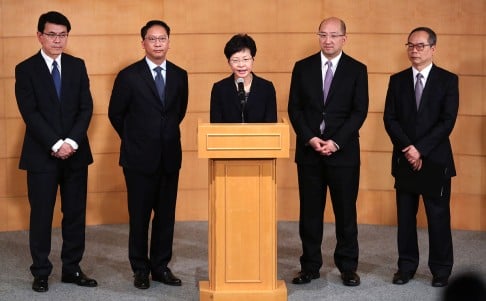
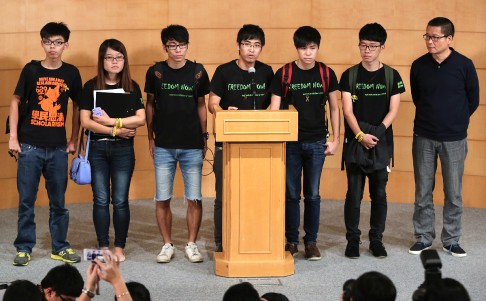
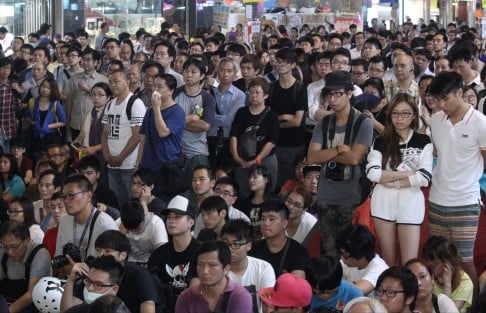
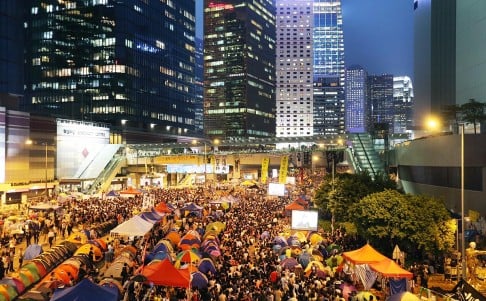
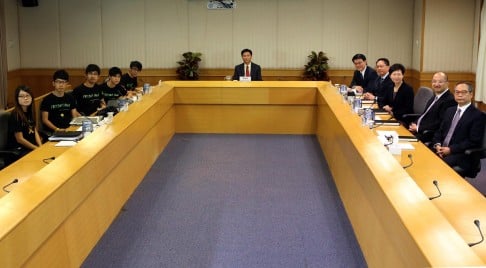
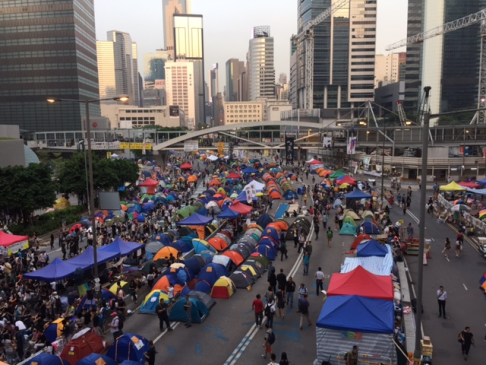
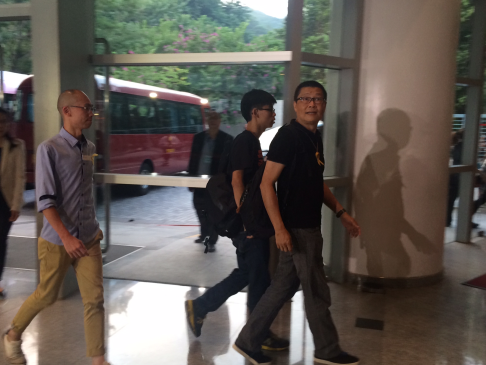
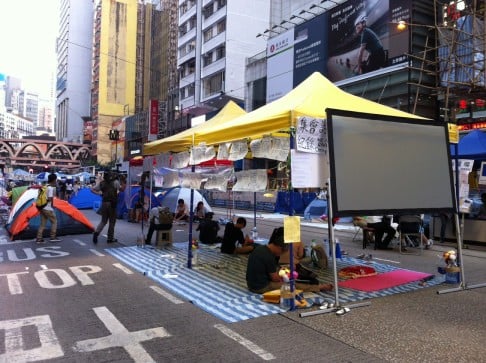

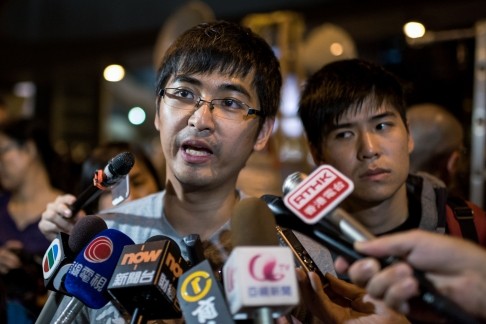

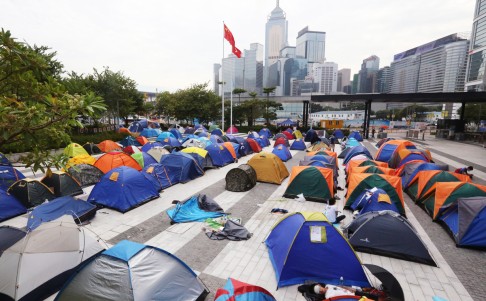
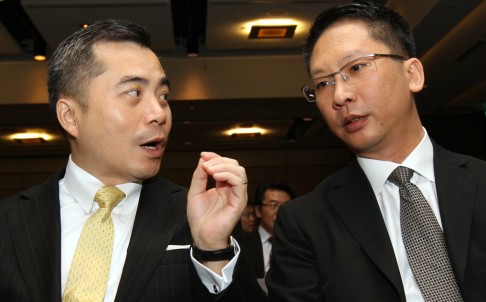
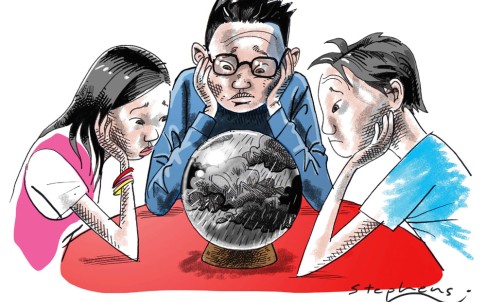
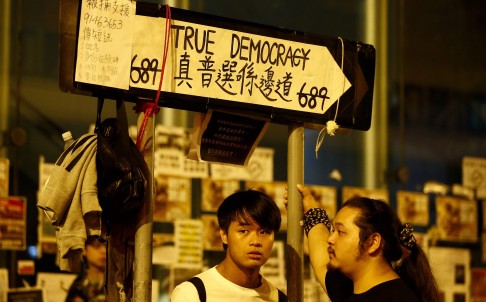
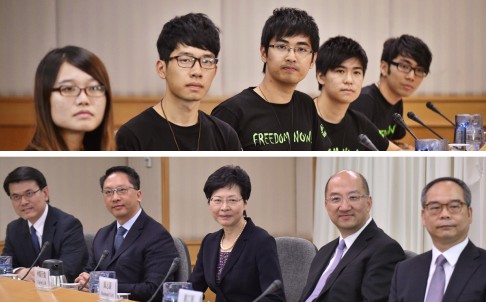

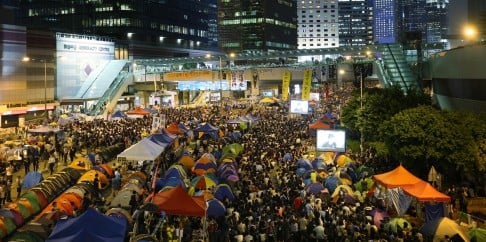


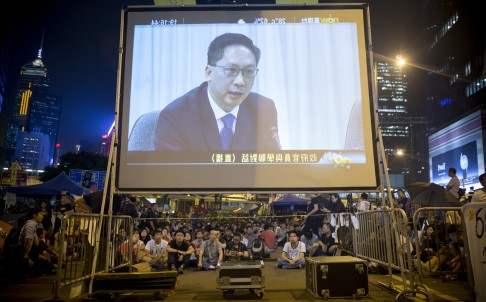
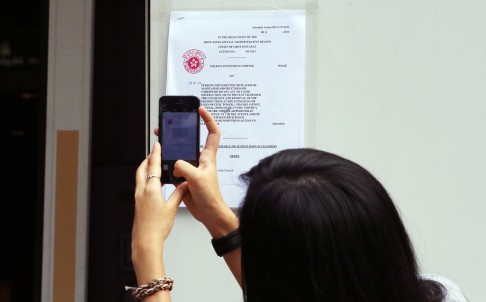
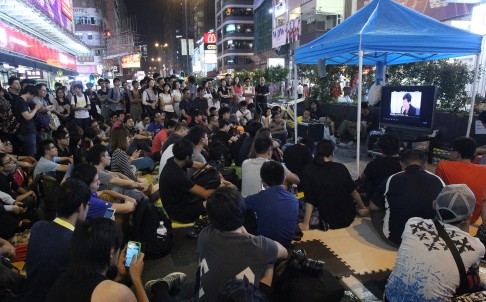
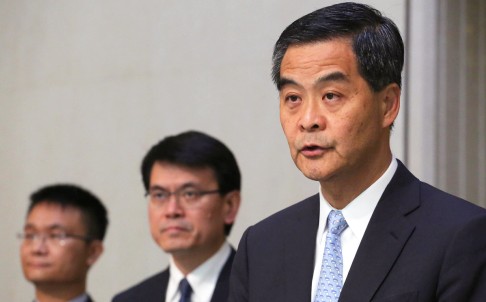
沒有留言:
張貼留言